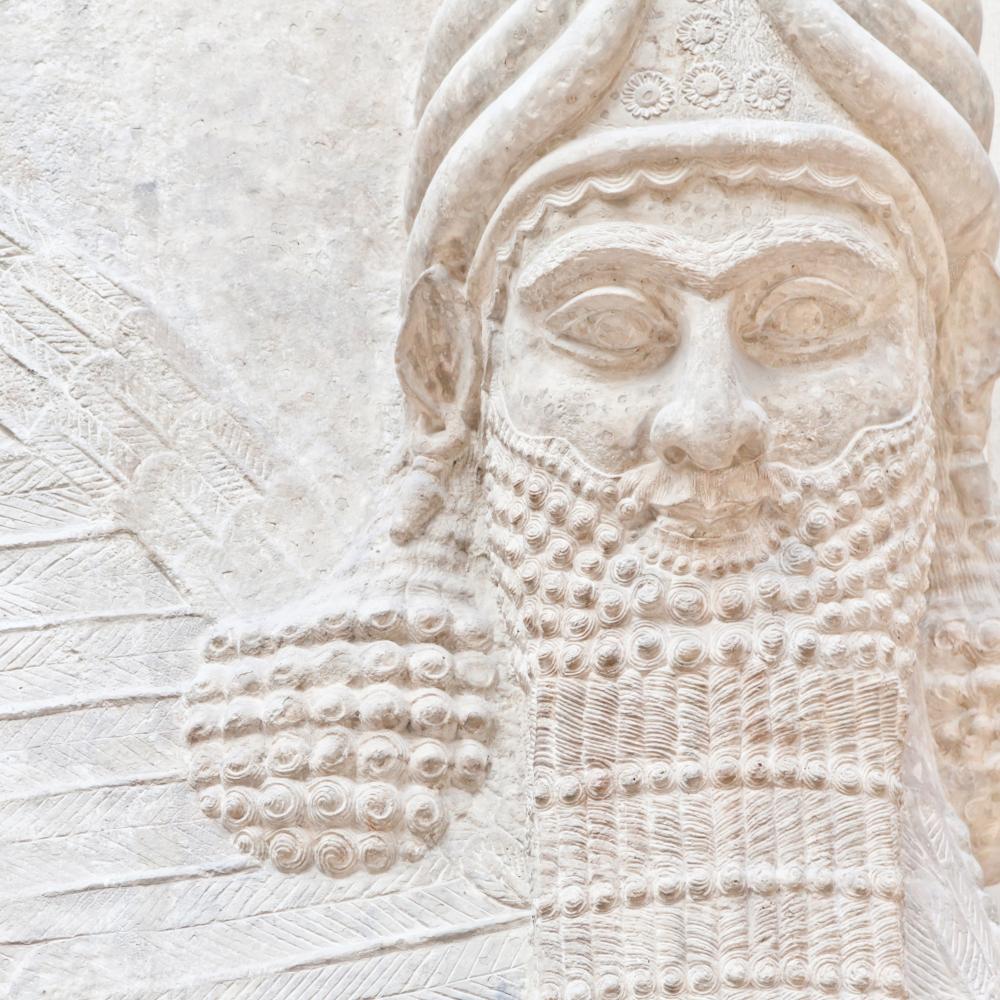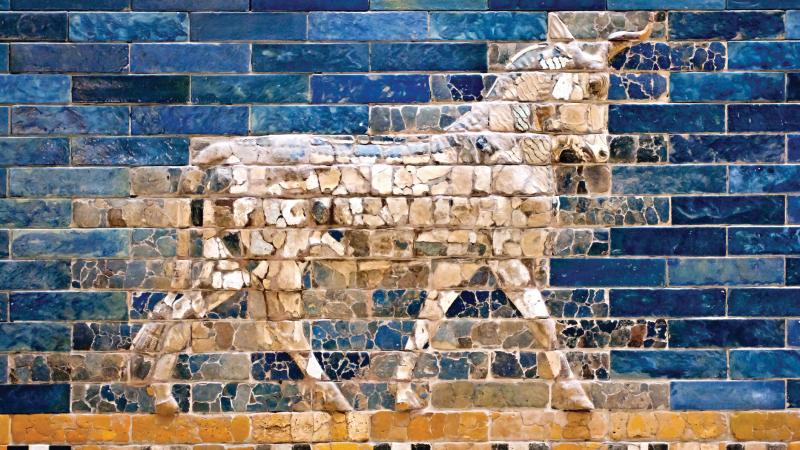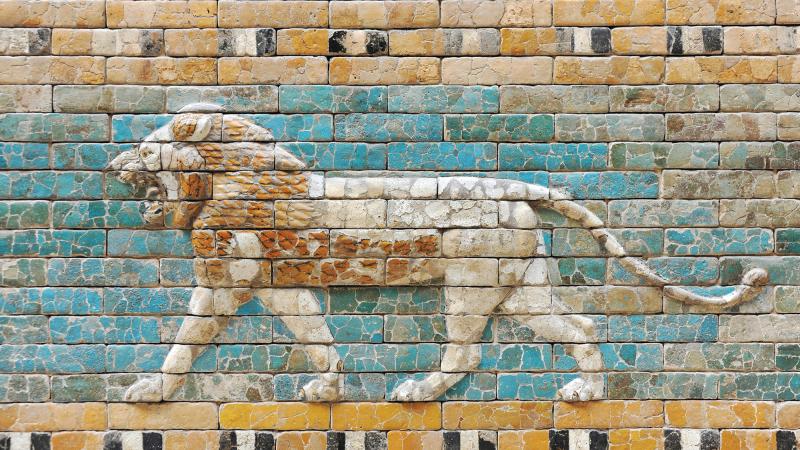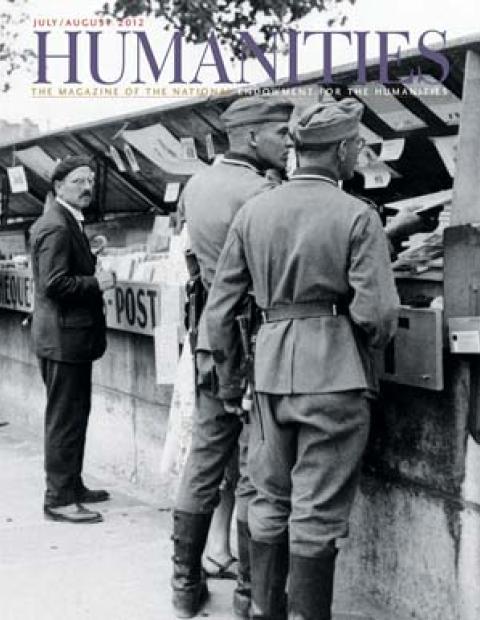The Epic of Gilgamesh has been read in the modern world for a little longer than a century, and, in that time, this oldest of stories has become a classic college text. In my own courses on ancient literature and mythology, it is the book I always begin with. But why should a tale whose origins stretch back more than four thousand years draw such attention in an age of genetic engineering and text messaging?
The answer I have given to hundreds of students is that almost every joy and sorrow they will face in life was revealed in Gilgamesh millennia before they were born. Reading Gilgamesh will not only teach them to face the challenges that lie ahead, but also give them an appreciation for the idea that no matter how much our modern world might seem different from earlier times, the essence of the human experience remains the same.
The story begins with a narrator urging his readers to examine the fine walls of Uruk, the magnificent city in southern Mesopotamia where Gilgamesh ruled. Hidden inside the walls is a treasure waiting to be discovered:
Find the cornerstone and under it the copper box
that is marked with his name. Unlock it. Open the lid.
Take out the tablet of lapis lazuli. Read how
Gilgamesh suffered all and accomplished all. *
Gilgamesh is described as two-thirds god, one-third man, and he reigns over his city without rival. He takes the young men of Uruk for his army and the young women for his bed. The people of the city cry out to the gods for relief from such an unstoppable force, prompting the rulers of heaven to create Enkidu, a wild man of the countryside who lives a life of Eden-like simplicity among the animals. But when the trappers of the wilderness grow tired of having game set free from their snares by Enkidu, they call on Shamhat, a temple prostitute of Uruk to come and, using sex, tame the wild man.
After an epic seven nights with the priestess, Enkidu loses his ability to commune with animals and seeks instead the company of his fellow humans in the city. There he meets, fights, and becomes friends with Gilgamesh, so that soon the two are closer than brothers. Indeed, the language used to describe the pair is more like that between husband and wife, though there is no sexual relationship implied.
Together, Gilgamesh and Enkidu travel to the Cedar Forest of the far north to battle the monster Humbaba and gain everlasting glory. Even as Humbaba is defeated and pleads for his life, Enkidu successfully urges Gilgamesh to slay him and take his head back to Uruk as a trophy. These heroics catch the eye of Ishtar, the divine embodiment of sexual desire and procreation. She seeks Gilgamesh as her husband, but is rejected by the king as an unreliable mate. Hell hath no fury like a goddess scorned, so she appeals to her father to send the violent Bull of Heaven to wreak destruction on Uruk as punishment for Gilgamesh’s rejection of her. Gilgamesh and Enkidu finally kill the beast, but this prompts a council of the gods to declare that Enkidu must die in retribution.
Gilgamesh watches helplessly as Enkidu passes into death:
Then he veiled Enkidu’s face like a bride’s.
Like an eagle Gilgamesh circled around him,
he paced in front of him, back and forth,
like a lioness whose cubs are trapped in a pit,
he tore out clumps of his hair, tore off
his magnificent robes as though they were cursed.
The king who could conquer men and monsters could not stop his friend from perishing. Overcome with grief and helpless before the inevitability of his own death, Gilgamesh abandons Uruk and begins a search for Utnapishtim, the man who survived the great flood and was granted immortality by the gods. If only he can learn the secret of Utnapishtim, he too might live forever.
On his long journey through the wilderness, Gilgamesh meets many characters who help him on his way, from scorpion beings who guard the passageway of the sun under the earth to the tavern-keeper Shiduri on the shores of the Sea of Death. She urges him to give up his futile quest for eternal life:
Humans are born, they live, then they die,
this is the order that the gods have decreed.
But until the end comes, enjoy your life,
spend it in happiness, not despair . . .
That is the best way for a man to live.
But the king will not listen. At last Gilgamesh finds Utnapishtim and hears from him the story of the great flood that destroyed all of humanity except for him and his wife. The tale is remarkably similar to the later tale of Noah found in the Hebrew Bible:
On Mount Nimush the ship ran aground,
the mountain held it and would not release it.
For six days and seven nights, the mountain
would not release it. On the seventh day,
I brought out a dove and set it free.
After hearing the flood story, Gilgamesh tries and fails to stay awake seven days to prove that he is worthy of living forever. As did Adam, he also loses to a crafty serpent the magical plant that would allow him to become young again. In the end, he returns home to Uruk, but all that is left for him is to admire the magnificent walls he has built, walls that will nonetheless someday turn to dust.
The story of Gilgamesh is based on a historical king of that name who lived in the Sumerian city of Uruk in present-day southern Iraq around 2700 BCE. He must have made quite an impression on the Sumerians, for within a few centuries they were recording stories about him on clay tablets using their wedge-shaped cuneiform script. The Babylonians under King Hammurabi and other rulers recorded the tales of Gilgamesh in their own language and spread them throughout the Near East. Art of the time preserves the story as well, especially the encounter with Humbaba.
The standard version of the epic we possess today may have been composed by a scribe named Sîn-lēqi-unninni in the thirteenth century BCE and includes the famous flood story found elsewhere in Near Eastern literature. The tablets were preserved in the royal palace at Nineveh in the first millennium BCE, but the story faded from memory in the centuries that followed. Gilgamesh is not mentioned in the Hebrew Bible, nor does he find his way into Greek mythology—though there are some intriguingly similar themes between the epic and Homer’s Iliad.
The clay tablets at Nineveh were buried beneath rubble and did not begin to be unearthed and translated until the late nineteenth century, when they caused a stir throughout the scholarly world. The announcement by British Museum curator George Smith to the Society for Biblical Archaeology in December of 1872 that he had discovered independent evidence for the biblical flood in the tablets of Gilgamesh was greeted with wild enthusiasm. His decipherment was crude, but it was an important beginning.
With ongoing discoveries of new tablets and advances in reading the ancient languages of the Near East, we have today a more complete and better understood version of the Epic of Gilgamesh than at any time in the past two thousand years, though there are still many gaps in the text and questions about the exact meanings of words. Nonetheless, we understand enough about the story so that even beginning undergraduates can read and discuss it profitably. My experience and that of other teachers is that students are amazed that such an old and strange story has so much that resonates in their own lives.
Gilgamesh introduces students to a world wildly different from their own, a world full of supernatural forces and gods such as Anu, Enlil, Ishtar, and Shamash who—while they may favor certain individual men and women at times—not only don’t love humanity, but are often viciously hostile to mortals. Yet, as foreign as the gods may be, the humans of the epic are painfully familiar. They are alternately caring and selfish, sympathetic and indifferent, hopeful and utterly despondent. Instructors and readers will discover their own lessons in the epic, but the universal themes of loneliness, companionship, love, loss, and death are among the many that every class seems to find.
The first awakening occurs early in the tale when Gilgamesh realizes that despite his superhuman abilities and dominion over thousands, he is essentially alone in the world. Striving for ever more wealth, power, and sex has left him without human connections.
Enter Enkidu. In many ways the opposite of Gilgamesh, Enkidu is a man of nature. But he also has much in common with the king. His encounter with Shamhat awakens within him a need for community. His newfound awareness also gives him a sense of moral outrage when he hears of Gilgamesh’s overbearing deeds. Students always notice that once Enkidu realizes a connection with others, he is unable to stand idly by when a preventable injustice occurs. Enkidu has never been to Uruk and he doesn’t know anyone in the city, but the mere rumor of mistreated subjects unable to stand up to an abusive ruler is too much for him. He knows that he alone has the ability to face Gilgamesh. And so he does, not because he is forced to act, but because he knows he can make a difference.
Unexpectedly, Enkidu’s fight with Gilgamesh leads both of them to finally find a true friend. Neither was whole without the other. Now they recognize, as Aristotle said, that life without friends is not worth living.
This newfound friendship opens a world of possibilities for the pair. Being adventurous young men eager to prove themselves and gain everlasting glory, they head off to fight the dreaded Humbaba. Terrifying dreams haunt Gilgamesh on the journey, filling him with fear and making him wonder if they should abandon their quest. But Enkidu encourages his friend to persevere and reminds him repeatedly that where one might fail, two can succeed. When Gilgamesh defeats the monster and holds him in his power, he wavers. Humbaba promises to be his servant and bring great honor to the king, but it is Enkidu who cuts the monster short and encourages his friend to finish what they have begun.
The seduction scene of Ishtar is always a favorite among students. The living embodiment of sexual desire stands before Gilgamesh and offers herself willingly to the king if only he will be her mate. But the virile, lusty Gilgamesh takes one look at the beautiful goddess and remembers all the previous men she had promised to make happy, only to destroy. His words of rejection to the goddess are stinging:
Why would I want to be the lover
of a broken oven that fails in the cold,
a flimsy door that the wind blows through,
a palace that falls on its staunchest defender.
He goes on to describe her as tar, a leaky waterskin, a battering ram, and a foot-mangling shoe.
Gilgamesh has looked beneath Ishtar’s enticing surface and found the selfishness she tried to hide. As he points out to her in their exchange, he has nothing she truly needs. He would end up like all her previous lovers, cast aside or dead when she tired of him. The sex would be fun while it lasted, but that would not be enough.
When Ishtar sets the destructive Bull of Heaven on Uruk, hundreds die as the beast rages. But the two friends rightly protect the city and defeat the bull, ripping out its heart. But it is then that Enkidu crosses the line. Seeing the defeated Ishtar standing on the walls, he tears off the hindquarters of the bull and flings them in her face:
If only I could catch you, this is what
I would do to you, I would rip you apart
and drape the Bull’s guts over your arms!
Even with his victory, Enkidu lets his anger get the better of him and shows no grace in victory. I remind the students that there will be plenty of occasions when, try as they might, they will fail. Remembering that the wheel of fortune will inevitably turn, I urge them be gracious winners. The person they have to fire some day may well be their boss in the future, just as the soul in need they pass on the street may someday be them.
Enkidu falls ill and lingers near death as Gilgamesh watches in agony. Why did my friend have to die? Will this also happen to me? These are the questions the young king asks as he lays Enkidu in his tomb. Following the funeral, Gilgamesh laments:
How can I bear this sorrow
that gnaws at my belly, this fear of death
that restlessly drives me onward?
His quest to find answers leads him on a tortuous journey through the wilderness—a metaphor for the experience everyone goes through when they lose someone they love. The broken Gilgamesh travels the world seeking answers, but seems to have forgotten everything he had learned earlier about the value of friendship. People along the way reach out to him, but he is so consumed by his own grief that he refuses to let them near. Even the counsel of the tavern-keeper Shiduri falls on deaf ears. “Make each of your days a delight,” she says. Go home, Shiduri urges the king, marry a loving wife and rejoice while you hold your children in your arms. Savor the life you have here and now. Gilgamesh, however, turns away.
I tell my students that grief, like anger, can consume them, if they allow it. Some of them have already lost someone dear and have learned this painful lesson, but I remind the rest that, sadly, they too will learn. When that day comes, I urge them, mourn deeply, always remember those you have lost, and then move on. Grief prolonged and embraced, as with Gilgamesh, is a selfish indulgence that no friend or loved one would desire for them.
But, of course, the major teaching from the Epic of Gilgamesh is that death is inevitable. Gilgamesh wastes so much time and energy in a futile effort to find eternal life. He turns his back on family and friends to wander the wilderness in search of something he can never have. Failing to gain immortality, he grasps for magic that will keep him young, only to lose that as well.
As I tell my students, whatever their values or religious traditions, they will save themselves a lot of trouble in life if they realize that they will grow old and eventually die. They can run marathons every weekend, eat nothing but organic vegetables, and have all the cosmetic surgery they want, but, in the end, it will not save them. They should take care of themselves, of course, for it would be a terrible waste not to strive for a long and happy life, but so much heartbreak has come to those who, like Gilgamesh, would not accept that they are mortal. Let them believe what they will about life after death, but this life has an ending for all of us, just as it had a beginning.
I’ve been teaching the Epic of Gilgamesh for more than twenty years and grow more enchanted with the story every time I read it. I also find great comfort in the fact that people four thousand years ago struggled with the same fundamental issues as we do today. Many of my students have returned to me years later and shared that although they may have forgotten most of what they learned about Greek verbs or Roman emperors, they still remember the story of Gilgamesh.
*Trans. Stephen Mitchell, Gligamesh: A New English Version.




